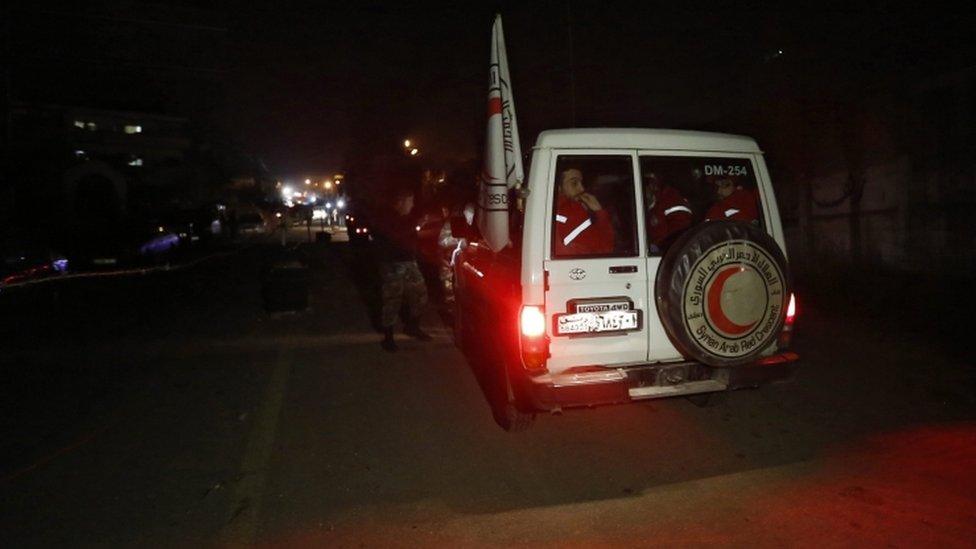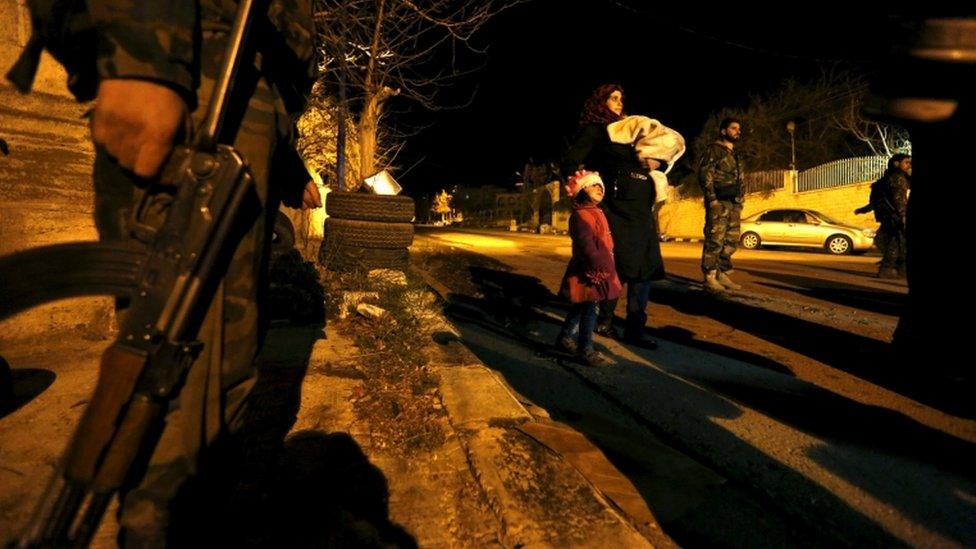Madaya Syria: Aid convoy reaches besieged town
- Published
Lyse Doucet reports there was joy and relief as aid arrived
An aid convoy has reached the besieged rebel-held Syrian town of Madaya, bringing vital food and medicines.
Distribution will continue through the night to 40,000 people who have been trapped for six months by a government blockade and without aid since October.
The UN says it has received credible reports of people dying of starvation.
Simultaneously, aid lorries entered two villages besieged by rebel forces in the northern province of Idlib under a deal between the warring parties.
The situation in Foah and Kefraya is also said to be extremely dire, with an estimated 20,000 people trapped there since March.
The arrival of the aid was delayed until both sets of lorries were ready to enter.

Distribution of supplies will continue through the night
Pawel Krzysiek, who is with the International Committee of the Red Cross (ICRC) in Madaya, said after arriving: "The people... were coming every five minutes asking, 'Listen, did you bring food, did you bring medicine?'
"Some are smiling and waving at us but many are just simply too weak, with a very bleak expression, too tired."

War of words - Lyse Doucet, chief international correspondent, BBC News, Beirut
This humanitarian mission was forged by a cruel conflict. Aid for rebel-held Madaya was contingent on help for government-controlled Foah and Kefraya.
Images of Madaya's emaciated children sparked alarm in many capitals and created greater impetus but they also provoked a war of words.
Supporters of the Syrian government and its Lebanese Hezbollah allies accused rebel forces in Madaya of seizing food for themselves. Some even mocked reports of starvation. The opposition charged President Assad's forces with more war crimes.
Today, Madaya is the face of Syria's suffering. Two years ago, it was Yarmouk.
These are moments that mobilise the world's sympathy but over the past year, only 10% of the UN's requests to deliver aid to people to in besieged and hard-to-reach areas were granted. That is where 4.5 million Syrians live.

One resident, Hiba Abdel Rahman, 17, told Agence France-Presse: "For 15 days we have been eating only soup.
"I saw a young man killing cats and presenting the meat to members of his family as rabbit. Some people went through garbage bins, others ate grass. We sought food from the fighters but they refused to give it to us."
In total, some 44 lorries operated by the UN, the ICRC, the Syrian Red Crescent and the World Food Programme reached Madaya from the capital, Damascus.

A few people have been given permission to leave Madaya
Another 21 entered Foah and Kefraya.
They were carrying basic food items - including rice, vegetable oil, flour, sugar and salt - as well as water, infant formula, blankets, medicines and surgical supplies.
Marianne Gasser, head of the ICRC's Syria delegation, said the deliveries should not be one-offs.
She said: "To relieve the suffering of these tens of thousands of people, there has to be regular access to these areas."

A few residents were given permission to leave and could be seen with belongings awaiting evacuation.
Madaya, which is about 25km (15 miles) north-west of Damascus and 11km from the border with Lebanon, been besieged since early July by government forces and their allies in Lebanon's Shia Islamist Hezbollah movement.
Brice de la Vigne from the medical charity Medecins Sans Frontieres (MSF) described the situation in the town as "quite horrific".
Mr de la Vigne, whose organisation supports a health centre in Madaya, told the BBC that more than 250 people there had "acute malnutrition".

'Ambiguous information' in local media - BBC Monitoring
Madaya is a major talking point in the Arabic media, with attitudes ranging from sympathy for its trapped inhabitants to anger at allegedly fake imagery.
Two pan-Arab satellite television channels that take a firmly pro-rebel line - Saudi-funded Al-Arabiya and Qatar's Al Jazeera - say the Syrian government and its Hezbollah allies are "starving Madaya to death".
But Syrian state and allied media dismiss the "rumours". Al-Baath newspaper accuses Al Jazeera and Al-Arabiya of a "misleading campaign, using photos of displaced and sick people from all over the world", and says the rebels are using civilians as human shields,
Some commentators try to take a broader view. Muhammad Kharrub in the Jordanian newspaper, Al-Rai, complains that the rebels themselves are besieging government-held towns, and Mahir Maqlad in Egypt's Al-Ahram notes that both sides "keep their information ambiguous to suit their own interests".

MSF said on Sunday that a total of 28 people - including six children less than one year old - had died of starvation in Madaya since 1 December.
However, Hezbollah has denied that there have been any deaths in the town, and accused rebel leaders of preventing people from leaving.
Blockades have been a feature of Syria's civil war. Up to 4.5 million people live in hard-to-reach areas, including nearly 400,000 people in 15 besieged locations who do not have access to life-saving aid.
In a separate development on Monday, activists said at least 12 children had been killed in an air strike on a school in the rebel-held town of Ain Jara, in Aleppo province.

What's happening in Syria?
More than 250,000 Syrians have lost their lives in almost five years of conflict, which began with anti-government protests before escalating into a brutal civil war. More than 11 million others have been forced from their homes as forces loyal to President Bashar al-Assad and rebels opposed to his rule battle each other - as well as jihadist militants from Islamic State.
Why are civilians under siege?
All parties to the conflict are using siege warfare, encircling populated areas, preventing civilians from leaving and blocking humanitarian access in an attempt to force opponents to surrender. Shortages of food, water, medicine, electricity and fuel have led to malnutrition and deaths among vulnerable groups.
Where are the sieges?
Government forces are besieging various locations in the eastern Ghouta area, outside Damascus, as well as the capital's western suburb of Darayya and the nearby mountain towns of Zabadani and Madaya. Rebel forces have encircled the villages of Foah and Kefraya in the northern province of Idlib, while IS militants are besieging government-held areas in the eastern city of Deir al-Zour.